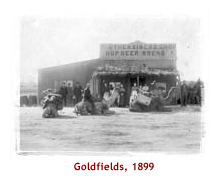 |
T'othersiders
 T'othersiders
came to Western Australia, as the name implies, from the other side of Australia,
brought to the colony by the lure of gold. A severe economic downturn in
eastern Australia during the early 1890s had coincided with the discovery
of large deposits of alluvial gold in Western Australia in 1892. The subsequent
gold rush saw a massive influx of people seeking their fortunes, bringing
great changes to Western Australia. T'othersiders
came to Western Australia, as the name implies, from the other side of Australia,
brought to the colony by the lure of gold. A severe economic downturn in
eastern Australia during the early 1890s had coincided with the discovery
of large deposits of alluvial gold in Western Australia in 1892. The subsequent
gold rush saw a massive influx of people seeking their fortunes, bringing
great changes to Western Australia.
Few of the thousands of miners who flocked to Coolgardie and Kalgoorlie,
became rich. The huge boost in Western Australia's population and the wealth
generated by the goldfields dramatically altered the social, political and
economic make-up of the colony. Until the 1890s, Western Australia's land,
wealth and power had been concentrated in the hands of a few families. The
miners in the goldfields community brought with them ideas of nationalism,
egalitarianism, socialism and republicanism. The tension between the newly
arrived t'othersiders and the colony's conservative elite was constant.
Many native-born and long-term residents of Western Australia were suspicious
of the recent arrivals. Western Australia's Premier, John Forrest, wanted
to use the wealth generated by the gold rush for the long-term development
of agricultural and pastoral industries to ensure continued prosperity.
Many were skeptical about the long-term future of the goldfields and doubted
that the t'othersiders would remain resident in Western Australia once the
gold had run out.
 For their part t'othersiders felt discriminated against due to the lack of adequate Parliamentary representation and the absence of key services such as fresh water. Many miners felt Perth to be remote and indifferent to their concerns. Some had never even been to Perth, having arrived in Western Australia via Albany or Esperance or having crossed the continent overland. For their part t'othersiders felt discriminated against due to the lack of adequate Parliamentary representation and the absence of key services such as fresh water. Many miners felt Perth to be remote and indifferent to their concerns. Some had never even been to Perth, having arrived in Western Australia via Albany or Esperance or having crossed the continent overland.
The level of mistrust and suspicion felt by t'othersiders is evident in
F.C.B. Vosper's editorial in the Coolgardie Miner on 24 September
1895 in which he observed that
"We may fairly honestly claim to be a separate race from
the Western Australians who for the most part are lacking in alertness,
enterprise and view which characterizes the Easterners."
For several years the conservative Legislative Council blocked moves to hold a referendum to decide on Federation, with members fearing that the Western Australian vote would be skewed by those born and raised in other parts of Australia. In the end t'othersiders helped Western Australia to return an overwhelming majority in favour of Federation. More than half the 'Yes' vote came from the goldfields, a fact that would lead Secessionists to claim that the referendum failed to reflect the true will of Western Australians.
|
 |